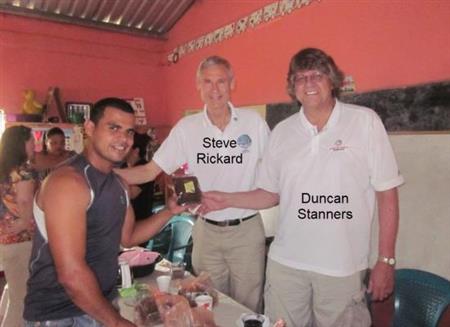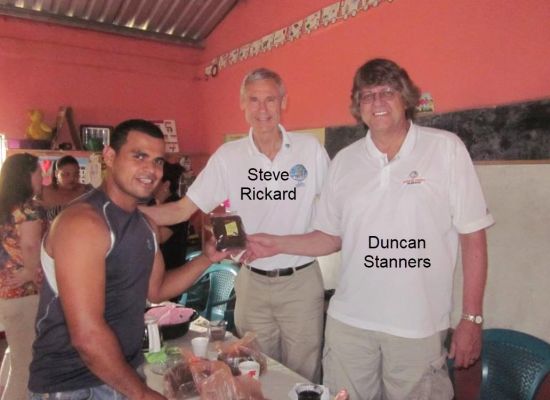
 |
|
Before the presentation, Duncan dedicated it to his late wife Jan, who was passionate about helping Hondurans, and to Arnoldo Alvarez who was our project manager in Honduras and had very recently passed away from cancer. Arnoldo grew up in a large family of poor farmers and earned a scholarship in agricultural engineering. For more than 30 years, he has brought clean, sustainable water to over 300 villages, helping thousands of people. One of his key reasons is to keep the young people on the farm rather than have them go to the cities in search of opportunities and end up in street gangs. His wife Marie Elena grew up middle class in Honduras and had a cushy job in Washington DC when she heeded a calling to return to Honduras to help the poor. They both truly embody Service Above Self, and Duncan recognised them both with Paul Harris Fellow awards. Marie Elena was attending virtually from Honduras while waiting for the next hurricane to hit.
The HECD was started in 2012 when Duncan joined Steve Rickard, microfinance guru from Calgary West, and Wally Gardiner from High River to launch a large microfinance program with a target of raising $1million over a number of years. Calling on an existing relationship with Opportunity International Canada (OIC), we searched for an area that was in Central America where Rotary had a focus and OIC had local operations and thereby chose Honduras.
At that time, Rotary International came out with new guidelines that promoted alignment with areas of focus, real community need, sustainability, measurable goals, collaboration and larger, more impactful projects. The HECD objectives were to increase the access to microfinance and increase service offered to include insurance and savings. Further, we were looking for other sustainable projects we could do there. We wanted to leverage our funding as much as possible and to establish a partnership infrastructure that could be used multiple times over the course of the program.
Reliable, trustworthy partners who can get the job done are a requirement and critical success factor for all international projects. Our partners in microfinance are OI, who have been operating over 30 years and have more than 9.6 million clients in 20 countries and IDH, their local operating partner who have been in business over 40 years and serve over 10,000 clients with 14 branches. Our partner in water is Impact Water, where Arnoldo operated in Honduras and others in other countries. The host clubs in Honduras, who must be in place in order to obtain RI funding, include Real de Minas in Tegucigalpa as well as Danli and Puerto Cortes. There are a large number of clubs in District 5360, as well as some in Ontario, Washington and Edmonton who have participated in the first five phases of the program. Duncan recognised the Rotary Club of Tillsonburg. Ontario who is leading phase six for having about 50 clubs involved. That's real collaboration!
Duncan showed a map to provide the location of the new branches of IDH we have helped establish, and to show where the water projects are.
Duncan talked about the methodology used by IDH. For the poorest people, they form trust groups of around 12 people (mostly women) who get small loans and guarantee the loans of other group members. They also receive instruction in 15 modules, not only to teach business skills, but to teach self confidence and other aspects, like how to keep their children out of gangs and how to improve family relationships. This holistic approach makes them more than just lending institution. Having proven success with small loans, some clients go on to solidarity groups, groups generally fewer than six who are given larger loans. Finally, there are private loans to small to medium enterprises (SMEs). Because IDH loses money on the trust groups, the profits they make on private loans helps subsidize the capability to offer loans to the poorest of the poor.
Focusing on water over his many years, Arnoldo has developed a methodology called Asset Based Community Development (ABCD). In the world, 50% of water projects cease to function, largely because the villages are not prepared to provide on-going maintenance. Arnoldo has been successful because he set up the villages to succeed and take ownership and responsibility. Villages seek out Arnoldo as news of his success has spread. He requires:
- They will appoint a water committee
- They will acquire access to the water source, and protect it
- They will provide all of the unskilled labour to construct the project
- They will appoint a plumber to perform maintenance
- Each family will contribute $1-$2 per month to a fund for maintenance
- hey will be trained in sanitation and prudent water usage
- They will provide him with a signed document agreeing to these terms
Otherwise, he will refuse the project.
Water projects do more than just provide clean water. In one village, the government provided them electricity and built a new middle school. This is important, as prior to this the children had to walk for miles to the nearest school. Girls in particular, were at risk. In the other village, some 50 families were returning to the village. They were able to build pilas (shower, toilet and sink) for their homes, increase production of loofahs and begin production of passion fruit. Use of water for increased business is paid for by the business, adding to the maintenance fund. Some villages also use the maintenance fund to provide microloans to members for things like new roof, floor or bedrooms.
Duncan showed a slide on fund leverage to illustrate the true power of Rotary. Beginning with just $10,000, getting support from local clubs, the Alberta government, the federal government, our District Designated Funds (DDF), the Rotary Foundation and Opportunity International, Phase II total funding was $900,000!
Finally, in a summary of funding raised in all 6 phases, Duncan recognised Bev Chinnery in Airdrie for phase I, Chris Ritter of Calgary West for phase III, Ken Montgomery from Calgary West for phase IV, Bill Fitzsimmons from Calgary West for phase V and John Gilvesy from Tillsonburg for phase VI for their leadership. The total program has raised $2.4 million, smashing the target! Duncan also noted that the return on investment for water is 8:1, mostly due to more time for new business and health. Return on investment in microfinance is 6:1 in the first five years, with one new job created for every two loans given out.
Steve Rickard thanked Duncan for his presentation.